De Colombiaanse schrijver Gabriel García Márquez werd op 6 maart 1928 in de kustplaats Aracataca geboren. Zie ook alle tags voor Gabriel García Márquez op dit blog.
Uit: One Hundred Years of Solitude (Vertaald door Gregory Rabassa)
“When José Arcadio Buendía and the four men of his expedition managed to take the armour apart, they found inside a calcified skeleton with a copper locket containing a woman’s hair around its neck.
In March the gypsies returned. This time they brought a telescope and a magnifying glass the size of a drum, which they exhibited as the latest discovery of the Jews of Amsterdam. They placed a gypsy woman at one end of the village and set up the telescope at the entrance to the tent. For the price of five reales, people could look into the telescope and see the gypsy woman an arm’s length away. ‘Science has eliminated distance,’ Melquíades proclaimed. ‘In a short time, man will be able to see what is happening in any place in the world without leaving his own house.’ A burning noonday sun brought out a startling demonstration with the gigantic magnifying glass: they put a pile of dry hay in the middle of the street and set it on fire by concentrating the sun’s rays. José Arcadio Buendía, who had still not been consoled for the failure of his magnets, conceived the idea of using that invention as a weapon of war. Again Melquíades tried to dissuade him, but he finally accepted the two magnetized ingots and three colonial coins in exchange for the magnifying glass. Úrsula wept in consternation. That money was from a chest of gold coins that her father had put together over an entire life of privation and that she had buried underneath her bed in hopes of a proper occasion to make use of it. José Arcadio Buendía made no attempt to console her, completely absorbed in his tactical experiments with the abnegation of a scientist and even at the risk of his own life. In an attempt to show the effects of the glass on enemy troops, he exposed himself to the concentration of the sun’s rays and suffered burns which turned into sores that took a long time to heal. Over the protests of his wife, who was alarmed at such a dangerous invention, at one point he was ready to set the house on fire. He would spend hours on end in his room, calculating the strategic possibilities of his novel weapon until he succeeded in putting together a manual of startling instructional clarity and an irresistible power of conviction. He sent it to the government, accompanied by numerous descriptions of his experiments and several pages of explanatory sketches, by a messenger who crossed the mountains, got lost in measureless swamps, forded stormy rivers, and was on the point of perishing under the lash of despair, plague, and wild beasts until he found a route that joined the one used by the mules that carried the mail.”
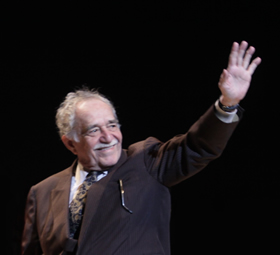
De Duitse dichter en schrijver Günter Kunert werd geboren op 6 maart 1929 in Berlijn. Zie ook alle tags voor Günter Kunert op dit blog.
Ins Morgenland
Der Boden jedem Schritte unbekannter.
Du spürst die Wahrheit: Nichts als Grauen.
Schon Deportierter, nicht mehr Abgesandter.
Verloren Weg und Steg und das Vertrauen
an jede gute Heimkunft unterdessen.
Was dich erwartet, mußt du täglich lesen
und mühst dich ab, es zu vergessen:
Daß du zur Zukunft unterwegs gewesen.
Diagnose
Bei dir bin ich ein Weißnichtwer.
Die Spiegel täuschen und es lügt
die eigne Stimme. Was mich betrügt,
ist gar mein Selbst, von Inhalt leer.
Bin süchtig nach der Sicherheit
verleibter Stunden, nach gewohnter Hand,
nach einem Vatermutterliebesland,
nach einem Dasein ohne Zeit,
nach etwas Glück aus reinem Leid.
Zur Nacht
Die Toten hängen in den Bäumen
wie Blätter und sie schwanken sacht
in vielen ungezählten Träumen,
aus denen das Gedenken schwer erwacht.
Nur nächtlings kehren ihre Wesen
zurück aus einem unbegriffnen Irgendwo.
Allein die Träume können sie erlösen,
denn in den Träumen sind sie wieder froh
und jung und ungeängstet: wohlgemut.
In Träumen wachen sie im Schläfer auf,
indessen der bei Todes Bruder ruht,
dem Leben fern wie ihrem Lebenslauf.
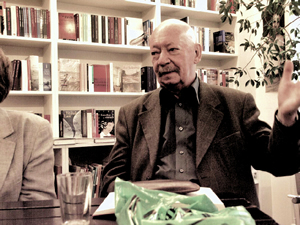
De Surinaamse schrijver Clark Accord werd op 6 maart 1961 geboren in de Surinaamse hoofdstad Paramaribo. Zie ook alle tags voor Clark Accord op dit blog.
Uit: Bingo
““De rook van de sigaretten waarmee de zenuwen in bedwang worden gehouden, hangt als een ijl wolkendek onder het plafond. Achter in de zaal prijkt op een wit papier in zwierige, handgeschreven letters de tekst VERBODEN TE ROKEN. De door dampen omgeven vermaning werkt op Leanda’s lachspieren. Het wordt tijd dat ze zich weer eens beklaagt bij René, de eigenaar van de Suikertuin. Ze vindt het storend dat ze ongewild blootgesteld wordt aan de kankerverwekkende uitstoot van mensen die hun leven en dat van anderen op het spel zetten, louter en alleen omdat ze te zwak zijn om zich te bevrijden van het kwaad dat hen regeert. Nee, zo niet Leanda! Zij gaat er prat op zich door niets en niemand de wet te laten voorschrijven.”
(…)
“Leanda reikt naar de hand van haar dochter. Ze legt hem boven op de doos met de magnetron. Zonder iets te zeggen houdt ze haar vast. Woorden schieten te kort om de puinzooi die ze van haar leven en dat van haar dochter heeft gemaakt uit te drukken. Voor Aisa moeten ze een uitweg vinden uit deze ellende.
In stilte staren moeder en dochter voor zich uit. Ronkend zoekt de bus zijn weg in het donker. Buiten is het opgehouden met regenen.”
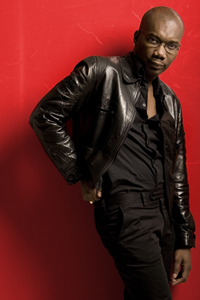
De Engelse dichteres Elizabeth Barrett Browning werd op 6 maart 1806 geboren in Durham, Engeland. Zie ook alle tags voor Elizabeth Barrett Browning op dit blog.
Sonnet IV
Thou hast thy calling to some palace-floor,
Most gracious singer of high poems ! where
The dancers will break footing, from the care
Of watching up thy pregnant lips for more.
And dost thou lift this house’s latch too poor
For hand of thine ? and canst thou think and bear
To let thy music drop here unaware
In folds of golden fulness at my door ?
Look up and see the casement broken in,
The bats and owlets builders in the roof !
My cricket chirps against thy mandolin.
Hush, call no echo up in further proof
Of desolation ! there ’s a voice within
That weeps . . . as thou must sing . . . alone, aloof
Sonnet V
I lift my heavy heart up solemnly,
As once Electra her sepulchral urn,
And, looking in thine eyes, I overturn
The ashes at thy feet. Behold and see
What a great heap of grief lay hid in me,
And how the red wild sparkles dimly burn
Through the ashen greyness. If thy foot in scorn
Could tread them out to darkness utterly,
It might be well perhaps. But if instead
Thou wait beside me for the wind to blow
The grey dust up,…those laurels on thine head,
O my Belovèd, will not shield thee so,
That none of all the fires shall scorch and shred
The hair beneath. Stand farther off then! go.
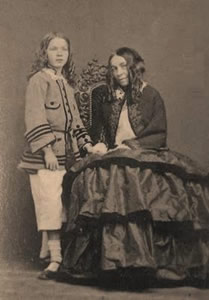
Hier met haar zoon Robert, bijgenaamd „Pen“
De Franse schrijver Stéphane Hoffmann werd geboren op 6 maart 1958 in Saint-Nazaire. Zie ook alle tags voor Stéphane Hoffmann op dit blog.
Uit: Des filles qui dansent
“Si on voulait choquer les filles des roseaux, il fallait leur parler d’amour. ça les bloquait. Toujours prêtes à vous sucer, jamais à vous aimer. Conter fleurette, c’était pere de temps. L’amour était juste un truc dont elles avaient entendu parler. Un truc pas net. Le solide, pour elles : la baise et le mariage, leurs deux passions. Malheureusement, je suis un sentimental. Comme disait l’autre : je ne donne pas mon âme sans mon corps ni mon corps sans mon âme.”
(…)
“Je l’aime cette plage. Elle varie tout le temps et ne change jamais. C’est un miroir sur lequel se reflètent les humeurs du ciel et des nuages, du soleil et du vent. La plage, seule, est imperturbable, elle s’en fout et reste là. Elle a bien raison, c’est une leçon pour la vie, et c’est ma devise : il faut s’en foutre et rester là.”
(…)
“Ce que mon frère a vécu, Balzac l’avait raconté. Il faut choisir entre l’amour et le mariage. L’amour est un sentiment, le mariage un contrat. L’amour est un feu, le mariage un seau d’eau. Le mariage, c’est l’amour mis en prison par la société.”
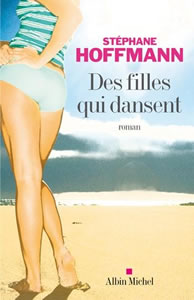
Cover
De Italiaanse beeldhouwer, schilder, architect en dichter Michelangelo werd geboren op 6 maart 1475 in Caprese. Zie ook alle tags voor Michelangelo op dit blog.
To The Supreme Being
The prayers I make will then be sweet indeed,
If Thou the spirit give by which I pray:
My unassisted heart is barren clay,
Which of its native self can nothing feed:
Of good and pious works Thou art the seed,
Which quickens only where Thou say’st it may;
Unless Thou show to us Thine own true way,
No man can find it: Father! Thou must lead.
Do Thou, then, breathe those thoughts into my mind
By which such virtue may in me be bred
That in Thy holy footsteps I may tread;
The fetters of my tongue do Thou unbind,
That I may have the power to sing of Thee,
And sound Thy praises everlastingly.
Vertaald door William Wordsworth
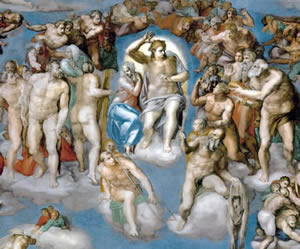
Michelangelo; Het laatste oordeel, Fresco, Sixtijnse kapel
Zie voor nog meer schrijvers van de 6e maart ook mijn blog van 6 maart 2012 deel 2.
